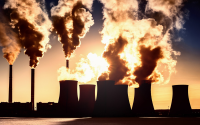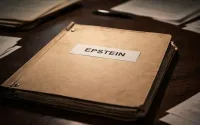International Herald Tribune
PARIS With uncertainties increasing about supplies of natural gas and oil, nuclear energy is making a powerful global comeback, prompting concerns about atomic terrorism in the post-Sept. 11 era.
A number of countries around the world, from China to Finland and the United States, are gearing up to build new reactors as demand for electricity grows. Governments are also viewing nuclear power as a way to curb emissions of greenhouse gases, given intensifying concern over global warming.
But the prospect of an atomic renaissance is raising the uncomfortable question of whether an expansion of nuclear power is compatible with the fight against terrorism and the proliferation of weapons of mass destruction.
"Neither politics nor technology has an answer to this question right now," Gerard Stoudman, director of the Geneva Center for Security Policy, said in an interview at a recent international conference on homeland security.
"It's really bad timing," said Alain Marsaud, president of the domestic security group in the French Parliament.
"We're coming to the end of the economic use of fossil fuels at a time when terrorists are trying to get their hands on nuclear material or target nuclear infrastructure," Marsaud said in an interview at the conference, which was held in Geneva. "If the world is condemned to use more nuclear power, it will be a real challenge."
With 439 reactors operating in 31 countries around the world, nuclear power accounts for about 16 percent of global power production today, according to the International Atomic Energy Agency. And with demand for electricity expected to increase almost fivefold over the next five decades, the agency says reactor capacity could quadruple by 2050.
The Far East is projected to lead worldwide growth over the next two decades, more than doubling its output.
Experts at the UN energy agency cite three risks in the expansion of nuclear power: theft by terrorists of weapons-grade plutonium stripped out from radioactive waste during reprocessing; an attack on a nuclear installation or transport convoy; and, as suspected with Iran and North Korea, an attempt by countries developing a nuclear power sector to build weapons with the same technology.
"If you have more nuclear material in the world, you have a higher proliferation risk - it's a truism," said Alan McDonald, a nuclear expert at the agency. But with demand for electricity increasing across the globe, he added, nuclear energy remains important despite the risks.
Signaling the nuclear revival, 31 reactors are currently under construction worldwide. China plans to add 32 nuclear power plants to its existing 11 by 2020, while India, currently with 14 plants, aims to triple its reactor capacity over the next eight years.
Japan, South Korea, Ukraine, Romania and Argentina are all in the process of adding to nuclear capacity as well.
Finland recently commissioned the first new plant in Western Europe since 1999. France - the biggest per-capita user of nuclear energy in the world - is planning to build one shortly (the site has not yet been chosen), and British officials are softening their language on nuclear energy.
Loyola de Palacio, the European Union's departing energy commissioner, said last month that the EU would have to retain the option of building up its nuclear capacity. "With the challenge of climate change, the EU cannot avoid nuclear energy for the foreseeable future," she said.
Even in the United States, where no new reactor has been built since the partial meltdown at Three Mile Island in Pennsylvania in 1979, the nuclear industry is stirring - not least because of encouraging noises from the Bush administration.
Twenty-six U.S. plants have received 20-year extensions of their operating licenses and 18 others have applied for extensions at the Nuclear Regulatory Commission, after the administration streamlined the relicensing process.
Three plant operators, Exelon, Dominion and Entergy, have asked the commission to approve sites for future reactors, although no concrete plans for building them have been announced yet. And Westinghouse, architect of nearly half of the world's nuclear power plants, had its design for a plant known as the "advanced reactor" approved by the commission on Sept. 13.
The industry, said Steve Kerekes, a spokesman for the Nuclear Energy Institute, America's nuclear industry group, is at the starting gate.
"We are positioning ourselves for the fact that over the next decade our country will need a lot more electricity," Kerekes said. The goal for the industry, he said, is to raise its share of American electricity generation from the current 20 percent to 24 percent over the next 15 years. If natural gas prices keep rising, it will become economical to pay the hefty price - about $3 billion each - of building new nuclear plants, he said.
The risk of terrorists targeting nuclear infrastructure was made plain on Sept. 11, 2001. Since then, Western policy makers, from President George W. Bush to the EU's security chief, Javier Solana, have explicitly made the fight against nuclear terrorism a priority. Bush has said that Americans' "highest priority is to keep terrorists from acquiring weapons of mass destruction." His Democratic challenger in next month's presidential election, Senator John Kerry, put it this way in a speech in June: "No material. No bomb. No terrorism."
At nuclear plants in many countries, 9/11 has led to stricter security requirements. In the United States since the terror attacks, plant owners will have spent an extra $1 billion by the end of this year on more restrictive access controls, heavily armed guards, additional training for their security personnel and vehicle checks in an enlarged perimeter around the reactors to avoid truck bombs.
According to Wolfgang Kröger, a nuclear engineer and vice president of the International Risk and Governance Council, an independent foundation with headquarters in Geneva, the danger of terrorists targeting nuclear infrastructure or transport vehicles has been played up by opponents. "There are a lot of much simpler ways to do damage and kill people," he argues.
But with most of the projected growth in nuclear power taking place in the developing world, where safety measures may not match the same standards, concerns are growing.
Perhaps the greatest worry circulating in national defense departments and the North Atlantic Treaty Organization in Brussels is the development of nuclear weapons on the back of civilian energy programs.
This dilemma goes to the heart of the Nuclear Nonproliferation Treaty, of which the International Atomic Energy Agency is the guardian. In addition to nuclear disarmament, the treaty commits its 184 signatories to police and control the proliferation of nuclear material and at the same time obliges nuclear powers to offer nuclear technology to others for electricity generation.
But as one senior diplomat at NATO put it: "You cannot artificially separate the civilian from the military aspect - everyone here is aware of that. As such, you also cannot separate the debate on nuclear proliferation from the debate on alternative sources of energy."
Every state that has sought to develop a nuclear weapons program since the Nuclear Nonproliferation Treaty came into effect in 1970 has done so on the back of civilian power or nuclear research programs - from Israel to India and Pakistan and, according to its government, North Korea.
The motivation for building nuclear weapons has increased with the spread of nuclear power, as countries view neighbors' stockpiles of civilian material with suspicion. To justify its weapons program, North Korea cites the five tons of radioactive material now stockpiled in Japan.
The International Atomic Energy Agency wants to curb proliferation by securing the nuclear fuel cycle with a process called fuel leasing, McDonald said. Rather than exporting enrichment or reprocessing technology to newcomers, the agency maintains, nuclear powers should export lightly enriched uranium, which cannot be used to make a bomb, and subsequently take back the radioactive waste, which contains plutonium.
But opponents say the proposal is flawed for two reasons: It would lead to the regular transport of radioactive material across the globe, potentially tempting terrorists. And it risks meeting public opposition in Europe, where the issue of radioactive waste has been one of the main reasons for public skepticism toward nuclear energy.
"These solutions don't stand up in the real world," said Mike Townsley, director of communications for Greenpeace International. "You'd get shipments crisscrossing the planet every week, and I think you'll find that people in the U.K. or Russia would not tolerate an influx of radioactive waste.''






